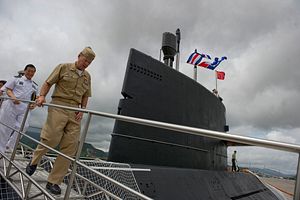Asia’s military buildup is occurring largely unchecked by institutions and unknown to publics, raising serious governance concerns, a leading anti-corruption watchdog found in a report released November 4.
Of the 17 states that London-based Transparency International assessed in the Asia-Pacific region in its “Government Defense Anti-Corruption Index,” eleven are considered to be at least at “high risk” of defense corruption, including China, India, Pakistan and six of the seven Southeast Asian states (Indonesia, Malaysia, Philippines, Thailand, Cambodia, and Myanmar).
“The intention underlying the rapid growth of military capabilities of countries is not always clear to their own people, never mind their neighbors and the outside world,” the report finds.
Only 6 out of the 17 countries studied were found to publish their defense budgets with enough detail to enable public oversight, and not a single country was assessed to have adequate legislative oversight of defense spending.
The two-year study also looked at the involvement of defense institutions in economic activities, concluding that seven countries had significant ownership of commercial businesses with zero or limited transparency in relation to operations and financing. None of these countries were judged to have had adequate independent audit (or equivalent mechanisms) for scrutiny in place.
The report singled out China in a separate section, noting not only “major gaps” in transparency and institutionalized structures for oversight but also the lack of transparent checks and balances on power which creates unpredictability and mistrust amongst other regional actors.
“When there is low trust, transparency over new capabilities can be interpreted as an attempt to intimidate. So it is vital for regional stability that there are substantive mechanisms through which Chinese decision-making on defense and security policy could be meaningfully debated and challenged,” the report said.
With respect to ASEAN, the report found evidence of “a firm foundation” for realizing its vision as a community in accordance with its political security blueprint but also significant challenges. On the one hand, Singapore was unsurprisingly labeled the ASEAN leader, while other countries like the Philippines and Indonesia were also hailed for legislative oversight and debate.
But concerns were noted across most countries in the region such as the lack of public disclosure or legislative scrutiny, with Thailand, Myanmar, Cambodia and Malaysia said to be “examples of a direct contradiction to ASEAN values” outlined in the blueprint.
“Despite ASEAN states’ ambitions, there are weaknesses across all member countries and too many cases where the blueprint for accountability and governance laid out by the community is not being implemented,” it said.
There were some positive examples that stood out in the region, however. The report praised Japan, Australia, New Zealand and South Korea in particular for engaging in a formal public consultation on defense strategy. Those four countries along with Singapore and Taiwan also received credit for measures to ensure financial control over the military.
Unsurprisingly, the study also found some cases where armed forces are either acting in direct contradiction to the needs of the people or are perceived to be doing so as evidenced by low public confidence. In 65 percent of the countries studied, public trust in the military’s ability and will to address corruption was very low. Poor procurement practices along with armed forces contributing to regional instability were listed as two major reasons accounting for low public confidence.
Overall, the study concludes that with soaring defense budgets, stability depends on establishing clear standards for the way military power is governed, based on accountability to citizens and transparency. This, it says, will require measures such as building strong independent institutions and establishing regional standards.
“Leaders who seize the opportunity to tackle these issues will not only strengthen their military effectiveness and protect their borders from external threats but leave a legacy of prosperity and stability for future generations,” it said.

































